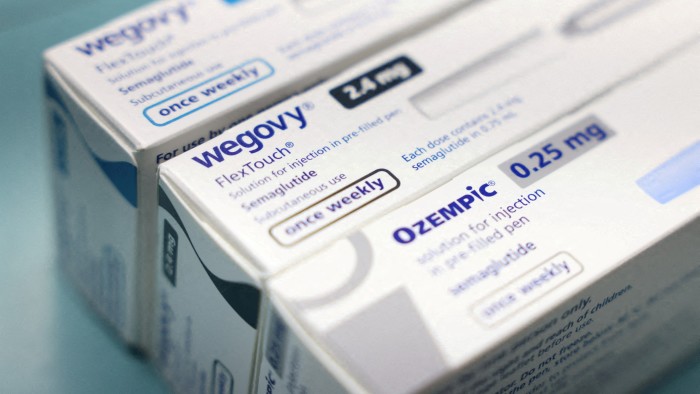Unlock the White House Watch newsletter for free
Your guide to what the 2024 US election means for Washington and the world
Prices for Novo Nordisk’s blockbuster diabetes and weight-loss drugs Ozempic and Wegovy could face steep price cuts in the US after the government included them in the next round of Medicare negotiations.
Joe Biden’s administration on Friday named semaglutide, the key ingredient in the two blockbuster Novo Nordisk medicines, among a group of 15 drugs whose prices will be negotiated directly between manufacturers and the government.
Investor concerns that prices for Novo Nordisk’s bestselling medicines could be significantly cut knocked the Danish drugmaker from its position as the largest company in Europe by market capitalisation. Its shares dropped 4.3 per cent to DKr575.6 ($79.33).
The group of drugs accounted for about $41bn in annual spending by Medicare, the state-backed insurance programme in the US for over-65s, and another round of negotiations could yield billions in savings.
In the first set of talks last year, Medicare knocked between 38 per cent and 79 per cent off US list prices. Drug-pricing controls formed a central part of Biden’s flagship Inflation Reduction Act, and his administration hailed $7.5bn in savings resulting from the conclusion of that first round.
In total, about a tenth of the 53mn patients enrolled in Medicare’s Part D prescription drug programme used at least one of the 15 drugs on the new list. Price negotiations affecting this group of medicines will start later this year, with price controls taking effect from 2027.
Between November 2023 and October 2024, about 2.3mn Medicare enrollees used one of the drugs based on semaglutide, mostly Ozempic, costing $14.4bn.
Novo Nordisk’s Rybelsus is also based on semaglutide and will be affected by the price caps.
Semaglutide sells for $997 a month when branded under Ozempic and $1,349 a month for Wegovy. The haircut to Ozempic may have a spillover effect on competitor drugs from Eli Lilly — Mounjaro and Zepbound — analysts noted.
Other drugs in the group of 15 include GSK’s chronic obstructive pulmonary disease treatment Trelegy Ellipta and Pfizer’s breast cancer drug Ibrance.
US health secretary Xavier Becerra said last year’s efforts proved negotiating for lower drug prices worked. “Now we plan to build on that record by negotiating for lower prices for 15 additional important drugs for seniors,” he added.
The latest price negotiation announcement arrives in the last days of the Biden administration, as president-elect Donald Trump prepares to take office for the second time. Trump, who has previously railed against high drug prices, is not expected to repeal the law altogether, but industry body the Pharmaceutical Research and Manufacturers of America is pushing for some changes.
Stephen Ubl, PhRMA president, described the IRA price-setting process as “dangerous for millions of Americans” and expressed the group’s eagerness to work with the incoming administration and Congress to fix the “pill penalty”, which means small-molecule drugs are eligible for drug price negotiations four years before complex biologic drugs.
Novo Nordisk said it remained opposed to government price setting through the IRA “and has significant concerns about how the law is being implemented by this administration”.
Read the full article here




